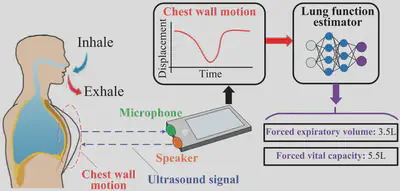SpiroSonic: monitoring human lung function via acoustic sensing on commodity smartphones

Abstract
Respiratory diseases have been a significant public health challenge. Efficient disease evaluation and monitoring call for daily spirometry tests, as an effective way of pulmonary function testing, out of clinic. This requirement, however, is hard to be satisfied due to the large size and high costs of current spirometry equipments. In this paper, we present SpiroSonic, a new system design that uses commodity smartphones to support complete, accurate yet reliable spirometry tests in regular home settings with various environmental and human factors. SpiroSonic measures the humans’ chest wall motion via acoustic sensing and interprets such motion into lung function indices, based on the clinically validated correlation between them. We implemented SpiroSonic as a smartphone app, and verified SpiroSonic’s monitoring error over healthy humans as <3%. Clinical studies further show that SpiroSonic reaches 5%-10% monitoring error among 83 pediatric patients. Given that the error of in-clinic spirometry is usually around 5%, SpiroSonic can be reliably used for disease tracking and evaluation out of clinic.
Basic Idea

System Overview
